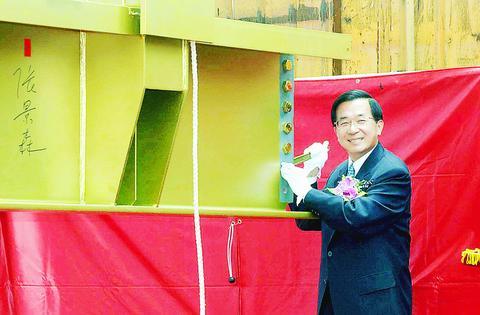President Chen Shui-bian (陳水扁) said the world's tallest skyscraper, Taipei 101, is a monument to the nation's can-do spirit amid an economic slowdown, a SARS epidemic and persistent friction with China.
The 101-story, NT$58 billion (US$1.7 billion) Taipei 101 building will stand a 508m when it is finished next year, lofting over the 101-story Mori Building under construction in Shanghai by only 16m.

PHOTO: CHIANG YING-YING, TAIPEI TIMES
"This building will lead Taiwan to the top of the world, giving Taiwan the drive to fulfill its dreams," said Chen , who approved its construction in 1997 when he was mayor of Taipei.
He made the remarks yesterday at a ceremony marking the fixing of the last steel beam on the top of the structure.
Chen may need more than bricks and mortar to rebuild public confidence. The nation's near-record jobless rate means weak demand for office space and slower consumer spending.
Taipei 101 will have the world's fastest elevators, according to skyscrapers.com Web site, and is one of the few super towers in the world to draw on traditional Chinese design. The building, which has been variously described as a growing bamboo shoot or an inverted pagoda, will contain 379,033 square feet of office space.
A shopping mall on the ground floor is due to open in November.
"Taiwan needs to find new growth industries that can sustain economic growth and fill the office spaces it is creating," said Simon Chao (
A place in the record books is lost on city residents who are looking for work.
"Taiwan's economy will not be revived even if they build 10 more skyscrapers," said Taipei taxi driver Chang Shu-mu, 49, who turned to taxis four years ago when house-painting jobs dried up.
"Unless the government can attract companies to make investments that can create jobs, all it is doing is creating more empty space," he said.
China Development Financial Holding Corp (
The Taiwan Stock Exchange Corp (
Construction has not been smooth. The skyscraper was canceled in 1999 after aviation authorities told the group to slash the height to 60 stories stories because of flight-safety concerns. Flight paths were later altered to allow the project to restart.
Construction was suspended for weeks in March last year for safety checks after a 6.8-magnitude earthquake shook loose two cranes atop the building, killing five people.
Financiers of the skyscraper also include Walsin Lihwa Corp (華新麗華), China Life Insurance Co (中國人壽), Cathay Financial Holding Co (國泰金控), Shin Kong Financial Holdings Co (新光金控), Chinatrust Financial Holding Company Ltd (中信金控) and Chunghwa Tele-com Co (中華電信).

Taiwan Semiconductor Manufacturing Co (TSMC, 台積電) yesterday said that its investment plan in Arizona is going according to schedule, following a local media report claiming that the company is planning to break ground on its third wafer fab in the US in June. In a statement, TSMC said it does not comment on market speculation, but that its investments in Arizona are proceeding well. TSMC is investing more than US$65 billion in Arizona to build three advanced wafer fabs. The first one has started production using the 4-nanometer (nm) process, while the second one would start mass production using the

A TAIWAN DEAL: TSMC is in early talks to fully operate Intel’s US semiconductor factories in a deal first raised by Trump officials, but Intel’s interest is uncertain Broadcom Inc has had informal talks with its advisers about making a bid for Intel Corp’s chip-design and marketing business, the Wall Street Journal reported, citing people familiar with the matter. Nothing has been submitted to Intel and Broadcom could decide not to pursue a deal, according to the Journal. Bloomberg News earlier reported that Taiwan Semiconductor Manufacturing Co (TSMC, 台積電) is in early talks for a controlling stake in Intel’s factories at the request of officials at US President Donald Trump’s administration, as the president looks to boost US manufacturing and maintain the country’s leadership in critical technologies. Trump officials raised the

‘SILVER LINING’: Although the news caused TSMC to fall on the local market, an analyst said that as tariffs are not set to go into effect until April, there is still time for negotiations US President Donald Trump on Tuesday said that he would likely impose tariffs on semiconductor, automobile and pharmaceutical imports of about 25 percent, with an announcement coming as soon as April 2 in a move that would represent a dramatic widening of the US leader’s trade war. “I probably will tell you that on April 2, but it’ll be in the neighborhood of 25 percent,” Trump told reporters at his Mar-a-Lago club when asked about his plan for auto tariffs. Asked about similar levies on pharmaceutical drugs and semiconductors, the president said that “it’ll be 25 percent and higher, and it’ll

CHIP BOOM: Revenue for the semiconductor industry is set to reach US$1 trillion by 2032, opening up opportunities for the chip pacakging and testing company, it said ASE Technology Holding Co (日月光投控), the world’s largest provider of outsourced semiconductor assembly and test (OSAT) services, yesterday launched a new advanced manufacturing facility in Penang, Malaysia, aiming to meet growing demand for emerging technologies such as generative artificial intelligence (AI) applications. The US$300 million facility is a critical step in expanding ASE’s global footprint, offering an alternative for customers from the US, Europe, Japan, South Korea and China to assemble and test chips outside of Taiwan amid efforts to diversify supply chains. The plant, the company’s fifth in Malaysia, is part of a strategic expansion plan that would more than triple